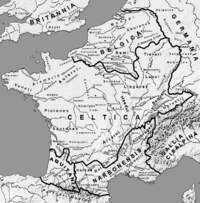
Tulingi
Encyclopedia

Helvetii
The Helvetii were a Celtic tribe or tribal confederation occupying most of the Swiss plateau at the time of their contact with the Roman Republic in the 1st century BC...
in the time of Julius Caesar
Julius Caesar
Gaius Julius Caesar was a Roman general and statesman and a distinguished writer of Latin prose. He played a critical role in the gradual transformation of the Roman Republic into the Roman Empire....
's conquest of Gaul. Their location is unknown; their language and descent are uncertain. From their close cooperation with the Helvetii it can be deduced that they were probably neighbours of the latter. At the Battle of Bibracte
Battle of Bibracte
The Battle of Bibracte was fought between the Helvetii and six Roman legions, under the command of Gaius Julius Caesar. It was the second major battle of the Gallic Wars....
in 58 BCE, they were, with the Boii
Boii
The Boii were one of the most prominent ancient Celtic tribes of the later Iron Age, attested at various times in Cisalpine Gaul , Pannonia , in and around Bohemia, and Transalpine Gaul...
and a few other smaller tribes, allies of the Helvetii
Helvetii
The Helvetii were a Celtic tribe or tribal confederation occupying most of the Swiss plateau at the time of their contact with the Roman Republic in the 1st century BC...
against the Roman legions of Caesar
Julius Caesar
Gaius Julius Caesar was a Roman general and statesman and a distinguished writer of Latin prose. He played a critical role in the gradual transformation of the Roman Republic into the Roman Empire....
.
Ancient source material on the Tulingi is scarce. The only reference is Caesar, who relates that with the Helvetii and the others they burned their homes and became part of the column of migrants seeking a new country in southern France. The column was defeated by Julius Caesar in the opening campign of the Gallic Wars, 58 BC. They were then returned to their homes, which they were compelled to rebuild. According to captured records in the Helvetian camp, the number of Tulingi, including fighting men, old men, women and children, had been 36,000, a small fraction of the total of 368,000, of which only 110,000 remained to return home after their surrender.
The main possibility as to their identity is that they were Celtic. As the "-ing-" in Tulingi is also a frequently used suffix in forming Germanic tribal names, a second theory, that they were Germanic, developed. This was championed by Rudolf Much
Rudolf Much
Rudolf Much , the son of archaeologist Matthäus Much, was an Austrian Germanist, considered one of the founding fathers of Germanic studies....
and other authors who proposed the now-discredited theory of "Alpine Germanic" tribes in the late Iron Age
Iron Age
The Iron Age is the archaeological period generally occurring after the Bronze Age, marked by the prevalent use of iron. The early period of the age is characterized by the widespread use of iron or steel. The adoption of such material coincided with other changes in society, including differing...
, to whom the Tulingi were counted. So far no Germanic etymology for the name has gained wider acceptance.
The ancient Boii had been displaced from the Danube by the Germanics. Those in Gaul were a remnant, as the Tulingi may well have been. If they were, they might logically be found across the Rhine, in Germania
Germania
Germania was the Greek and Roman geographical term for the geographical regions inhabited by mainly by peoples considered to be Germani. It was most often used to refer especially to the east of the Rhine and north of the Danube...
. Why they did not ally with the Germanics, whom the Celts feared and disliked, remains unexplained. They appear briefly in Orosius' mention of the Helvetian campaign, manifestly based on Caesar. However, Orosius uses Latobrigi instead of Latovici. The "-brigi" would certainly identify a tribe with a Celtic name, and if they were Celtic, perhaps so were the Tulingi.
It is possible that the tribe appears in an independent later source contradicting the Germanic theory. About 360 AD Rufus Festus Avienus in Ora Maritima mentions a number of peoples living on the upper Rhône
Rhône
Rhone can refer to:* Rhone, one of the major rivers of Europe, running through Switzerland and France* Rhône Glacier, the source of the Rhone River and one of the primary contributors to Lake Geneva in the far eastern end of the canton of Valais in Switzerland...
in Valais
Valais
The Valais is one of the 26 cantons of Switzerland in the southwestern part of the country, around the valley of the Rhône from its headwaters to Lake Geneva, separating the Pennine Alps from the Bernese Alps. The canton is one of the drier parts of Switzerland in its central Rhône valley...
. Among them were the Tylangii, who have been tentatively identified as the descendants of Caesar's Tulingi. They were not located across the Rhine, but to the south of Lake Geneva
Lake Geneva
Lake Geneva or Lake Léman is a lake in Switzerland and France. It is one of the largest lakes in Western Europe. 59.53 % of it comes under the jurisdiction of Switzerland , and 40.47 % under France...
. Moreover, Avienus considers them Ligurians
Ligures
The Ligures were an ancient people who gave their name to Liguria, a region of north-western Italy.-Classical sources:...
. Some of the other names mentioned are Daliterni, Clahilci, neither of which is noticeably Germanic.

